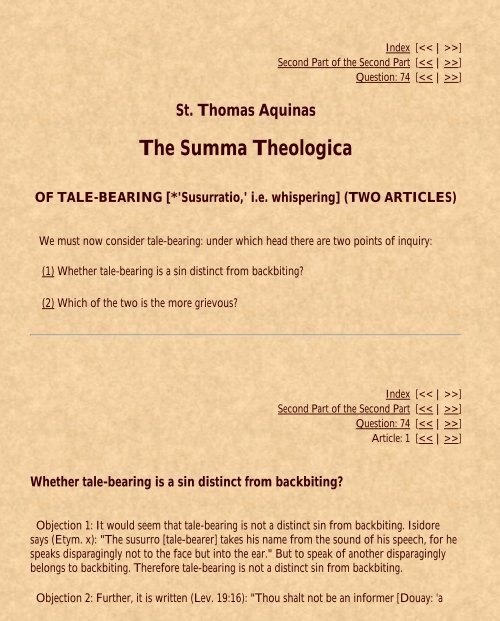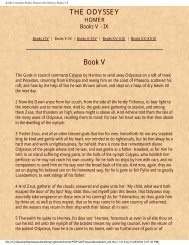Kolbe's Greatest Books: Thomas Aquinas Summa Theologica ...
Kolbe's Greatest Books: Thomas Aquinas Summa Theologica ...
Kolbe's Greatest Books: Thomas Aquinas Summa Theologica ...
You also want an ePaper? Increase the reach of your titles
YUMPU automatically turns print PDFs into web optimized ePapers that Google loves.
St. <strong>Thomas</strong> <strong>Aquinas</strong>The <strong>Summa</strong> <strong>Theologica</strong>Index [>]Second Part of the Second Part [>]Question: 74 [>]OF TALE-BEARING [*'Susurratio,' i.e. whispering] (TWO ARTICLES)We must now consider tale-bearing: under which head there are two points of inquiry:(1) Whether tale-bearing is a sin distinct from backbiting?(2) Which of the two is the more grievous?Index [>]Second Part of the Second Part [>]Question: 74 [>]Article: 1 [>]Whether tale-bearing is a sin distinct from backbiting?Objection 1: It would seem that tale-bearing is not a distinct sin from backbiting. Isidoresays (Etym. x): "The susurro [tale-bearer] takes his name from the sound of his speech, for hespeaks disparagingly not to the face but into the ear." But to speak of another disparaginglybelongs to backbiting. Therefore tale-bearing is not a distinct sin from backbiting.Objection 2: Further, it is written (Lev. 19:16): "Thou shalt not be an informer [Douay: 'a
detractor'] nor a tale-bearer [Douay: 'whisperer'] among the people." But an informer isapparently the same as a backbiter. Therefore neither does tale-bearing differ from backbiting.Objection 3: Further, it is written (Ecclus. 28:15): "The tale-bearer [Douay: 'whisperer'] andthe double-tongued is accursed." But a double-tongued man is apparently the same as abackbiter, because a backbiter speaks with a double tongue, with one in your absence, withanother in your presence. Therefore a tale-bearer is the same as a backbiter.On the contrary, A gloss on Rm. 1:29,30, "Tale-bearers, backbiters [Douay: 'whisperers,detractors']" says: "Tale-bearers sow discord among friends; backbiters deny or disparageothers' good points."I answer that, The tale-bearer and the backbiter agree in matter, and also in form or mode ofspeaking, since they both speak evil secretly of their neighbor: and for this reason these termsare sometimes used one for the other. Hence a gloss on Ecclus. 5:16, "Be not called a talebearer[Douay: 'whisperer']" says: "i.e. a backbiter." They differ however in end, because thebackbiter intends to blacken his neighbor's good name, wherefore he brings forward thoseevils especially about his neighbor which are likely to defame him, or at least to depreciate hisgood name: whereas a tale-bearer intends to sever friendship, as appears from the glossquoted above and from the saying of Prov. 26:20, "Where the tale-bearer is taken away,contentions shall cease." Hence it is that a tale-bearer speaks such ill about his neighbors asmay stir his hearer's mind against them, according to Ecclus. 28:11, "A sinful man will troublehis friends, and bring in debate in the midst of them that are at peace."Reply to Objection 1: A tale-bearer is called a backbiter in so far as he speaks ill of another;yet he differs from a backbiter since he intends not to speak ill as such, but to say anythingthat may stir one man against another, though it be good simply, and yet has a semblance ofevil through being unpleasant to the hearer.Reply to Objection 2: An informer differs from a tale-bearer and a backbiter, for aninformer is one who charges others publicly with crimes, either by accusing or by railingthem, which does not apply to a backbiter or tale-bearer.Reply to Objection 3: A double-tongued person is properly speaking a tale-bearer. For sincefriendship is between two, the tale-bearer strives to sever friendship on both sides. Hence heemploys a double tongue towards two persons, by speaking ill of one to the other: whereforeit is written (Ecclus. 28:15): "The tale-bearer [Douay: 'whisperer'] and the double-tongued isaccursed," and then it is added, "for he hath troubled many that were peace."
Index [>]Second Part of the Second Part [>]Question: 74 [>]Article: 2 [>]Whether backbiting is a graver sin than tale-bearing?Objection 1: It would seem that backbiting is a graver sin than tale-bearing. For sins of wordconsist in speaking evil. Now a backbiter speaks of his neighbor things that are evil simply,for such things lead to the loss or depreciation of his good name: whereas a tale-bearer is onlyintent on saying what is apparently evil, because to wit they are unpleasant to the hearer.Therefore backbiting is a graver sin than tale-bearing.Objection 2: Further, he that deprives. a man of his good name, deprives him not merely ofone friend, but of many, because everyone is minded to scorn the friendship of a person witha bad name. Hence it is reproached against a certain individual [*King Josaphat] (2 Paralip19:2): "Thou art joined in friendship with them that hate the Lord." But tale-bearing deprivesone of only one friend. Therefore backbiting is a graver sin than tale-bearing.Objection 3: Further, it is written (James 4:11): "He that backbiteth [Douay:,'detracteth'] hisbrother . . . detracteth the law," and consequently God the giver of the law. Wherefore the sinof backbiting seems to be a sin against God, which is most grievous, as stated above(Question [20], Article [3]; FS, Question [73], Article [3]). On the other hand the sin of talebearingis against one's neighbor. Therefore the sin of backbiting is graver than the sin of talebearing.On the contrary, It is written (Ecclus. 5:17): "An evil mark of disgrace is upon the doubletongued;but to the tale-bearer [Douay: 'whisperer'] hatred, and enmity, and reproach."I answer that, As stated above (Question [73], Article [3]; FS, Question [73], Article [8]), sinsagainst one's neighbor are the more grievous, according as they inflict a greater injury on him:and an injury is so much the greater, according to the greatness of the good which it takesaway. Now of all one's external goods a friend takes the first place, since "no man can livewithout friends," as the Philosopher declares (Ethic. viii, 1). Hence it is written (Ecclus. 6:15):"Nothing can be compared to a faithful friend." Again, a man's good name whereofbackbiting deprives him, is most necessary to him that he may be fitted for friendship.Therefore tale-bearing is a greater sin than backbiting or even reviling, because a friend isbetter than honor, and to be loved is better than to be honored, according to the Philosopher(Ethic. viii).




